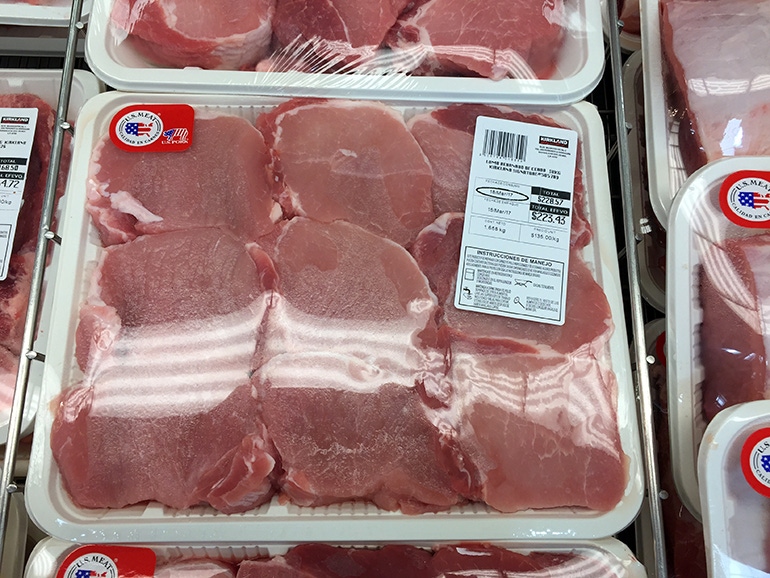Legislative Watch: Tariff retaliation begins; no U.S.-China agreement; Senate to discuss farm bill; Pork Board appointments named; ag consolidation documented; food waste caucus formed.

Canada, Mexico and the European Union have begun or announced their intentions to impose tariffs on U.S. products as a result of President Trump’s decision to impose tariffs on imports of certain steel and aluminum products. Canada and Mexico had previously received waivers that expired on May 31.
Mexico immediately imposed a 10% duty on essentially all U.S. chilled/frozen pork cuts, a 15% duty on sausages and a 20% duty on some prepared hams. On July 5, the 10% duty on chilled/frozen pork cuts will double to 20%. Pork items not included on the retaliatory list include variety meats, chilled/frozen carcasses/half carcasses, cured products and other processed pork products. Mexico is the U.S. pork industry’s largest market with $1.5 billion in sales. Other U.S. agricultural products on the retaliatory list include:
• Apples — 20% tariff. Mexico is the largest export market for U.S. apples worth $215 million.
• Cheese — Mexico imposed tariffs of 10% to increase to 20% on Italian style cheeses and tariffs of 15% that will increase to 25% on fresh cheeses. Mexico is the largest export market for the U.S. dairy industry.
• Other products on the retaliatory list include grapes and potatoes.
Canada announced it plans to impose tariffs up to $12.8 billion on U.S. steel, aluminum, agriculture and other products. The selected agricultural products worth approximately $2.5 billion could face a 10% tariff beginning on July 1. The agricultural products selected include prepared meals of bovine, tomato ketchup, whiskies, pizza and quiche, maple sugar and maple syrup, and soups and broths. The public has until June 15 to comment.
The European Union released a list in March that included bourbon whiskey, orange juice, cranberries, chewing tobacco, corn and other agricultural products.
The issue of trade and tariffs is expected to be major topics with the leaders of the United States, Canada, France, Great Britain, Germany, Italy and Japan at this weekend’s G7 summit in Canada.
U.S. and China do not reach agreement
The U.S.-China trade negotiations made little progress on a host of trade issues last week in Beijing. China let it be known that as long as the threat of the Trump administration imposing additional tariffs there would be no final agreement on China buying additional goods, including U.S. agricultural products. The Wall Street Journal reports that China was willing to buy $70 billion of U.S. agricultural and energy products if President Trump steps back from imposing tariffs.
President Trump has announced plans to move forward to impose 25% tariffs on $50 billion of Chinese products containing “industrially significant technology.” The administration is expected to announce by June 15 the list of Chinese products that the United States will impose the 25% tariff against.
The goal of the negotiations is to reduce the $375.2 billion trade deficit the United States has with China.
National Pork Board appointments
USDA announces new appointments to the National Pork Board. Those appointed to three-year terms are Gary Asay, Oscon, Ill.; Rich Deaton, New Madison, Ohio; Pat FitzSimmons, Dassel, Minn.; David Newman, Myrtle, Mo.; and Bill Tentinger, Le Mars, Iowa. Todd Erickson, Northwood, N.D., was appointed to serve the remaining two-year portion of a vacant position.
Senate ag committee to consider bipartisan farm bill next Wednesday
The leaders of the Senate Agriculture Committee, Chairman Pat Roberts (R-KS) and Ranking Member Debbie Stabenow (D-MI), announced they have reached an agreement on the Senate farm bill.
The bill increases the Conservation Reserve Program from 24 million acres to 25 million acres. The Senate bill will not include any of the expanded work requirements for the Supplemental Nutrition Assistant Program that are in the House bill. The text of the bill and a summary of the bill’s provisions are to be released today.
The committee will markup the bill June 13. The Senate is expected to consider the bill before the July 4 Congressional recess.
Farm consolidation of past 30 years documented
“Three Decades of Consolidation in U.S. Agriculture” is a new report by USDA’s Economic Research Service tracing the impact of farm consolidation. The report found that over the past 30 years, farm production continues to move toward larger farmers and there has been significant consolidation in livestock production.
The report found:
• In 2015, 51% of the value of U.S. farm production was from farms with sales of at least $1 million in sales. This compares to 31% in 1991.
• There has been significant consolidation in livestock production since the 1990s.
• Livestock production has become more specialized with 37% of all livestock produced on farms with no crop production in 2015, compared to 22% in 1996.
• Specialization in pork production increased 31% from 1996-2015.
• Family farms continue to account for approximately 90% of agricultural production.
Food Waste Caucus formed
Reps. Chellie Pingree (D-ME) and David Young (R-IA) have formed a bipartisan House Food Waste Caucus to identify ways to reduce food waste across the food supply chain. The Caucus also will offer educational opportunities to members of Congress and staff, and will support efforts to reduce food waste at federal agencies, including USDA and the Environmental Protection Agency. Additionally, the Caucus will collaborate with stakeholders to highlight food waste success stories.
Secretary of Agriculture Sonny Perdue recently hosted a food waste roundtable with Pingree and Young, food industry leaders and non-profit organizations. The roundtable was used to raise the awareness of food waste in the United States and discuss possible solutions.
It is estimated 40% of food produced in the United States is wasted. A recent USDA study found that U.S. consumers waste almost one pound of food per person per day.
About the Author(s)
You May Also Like



